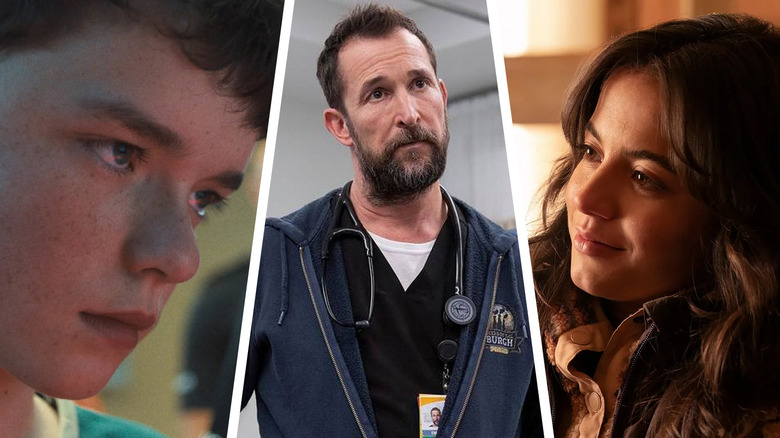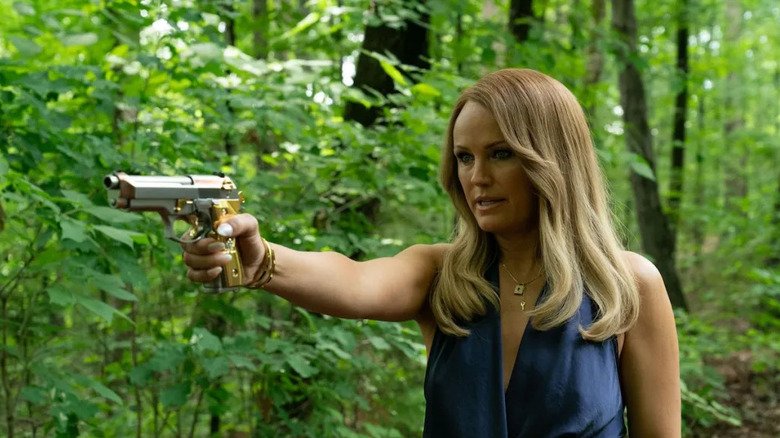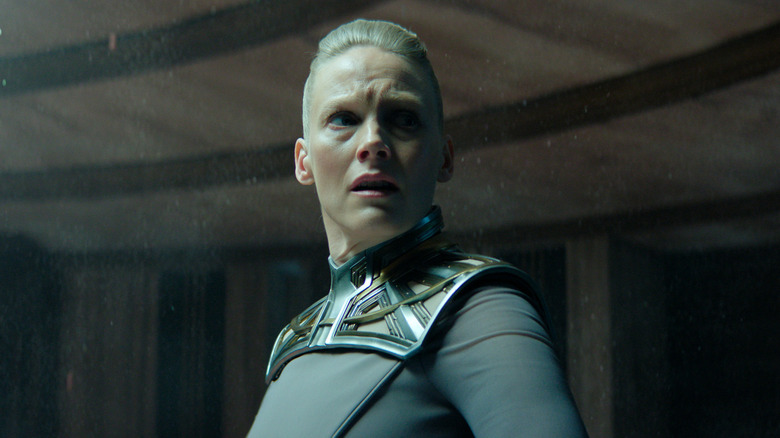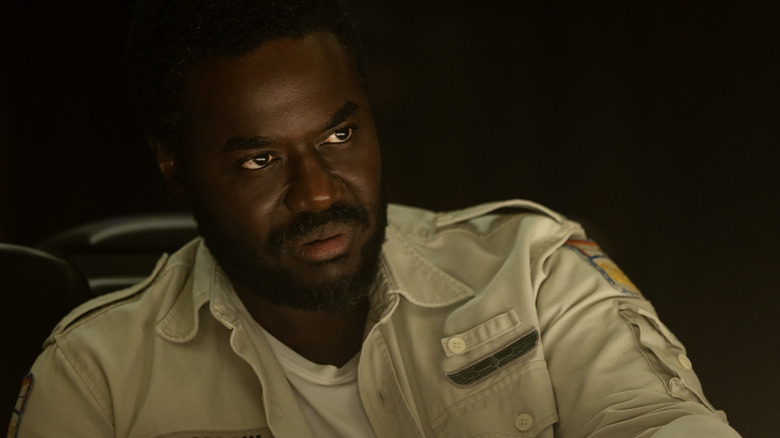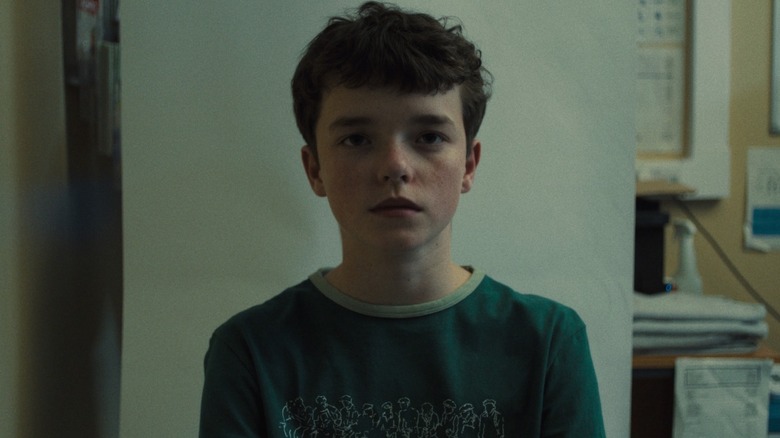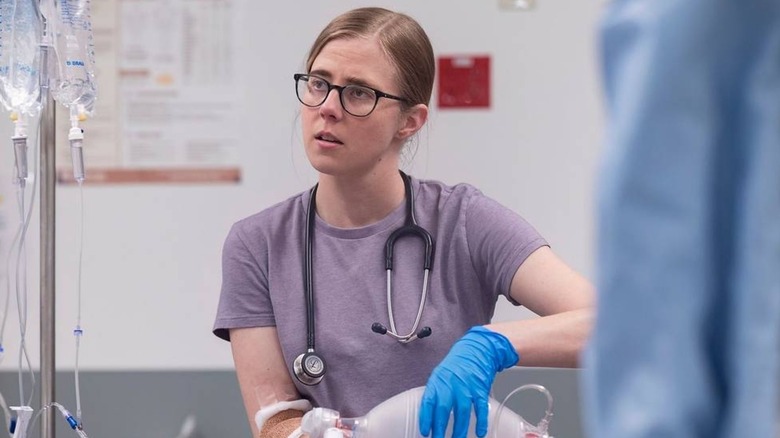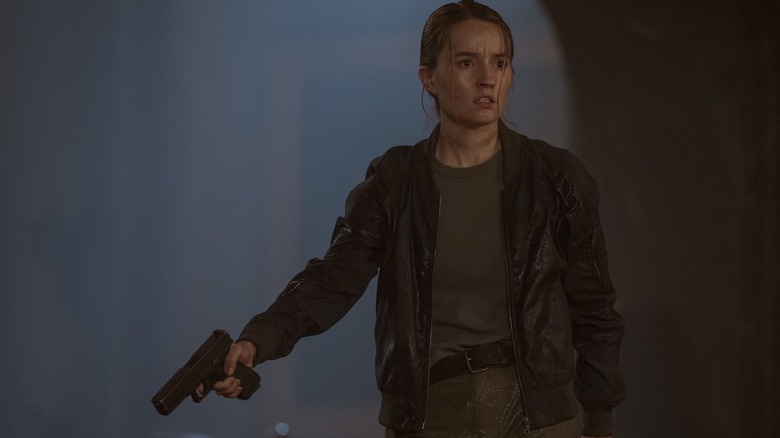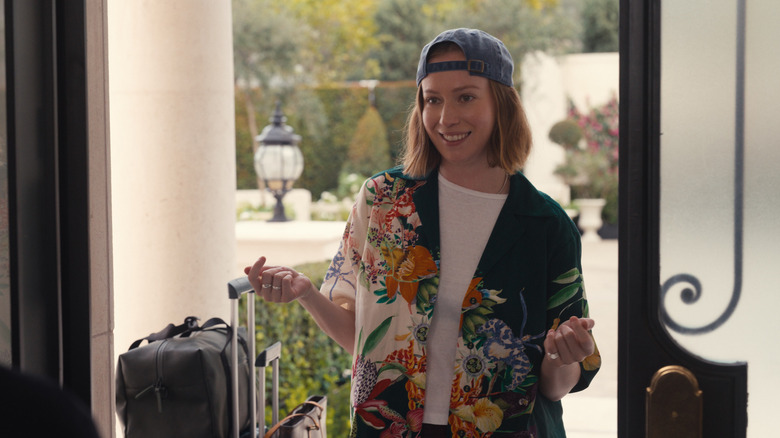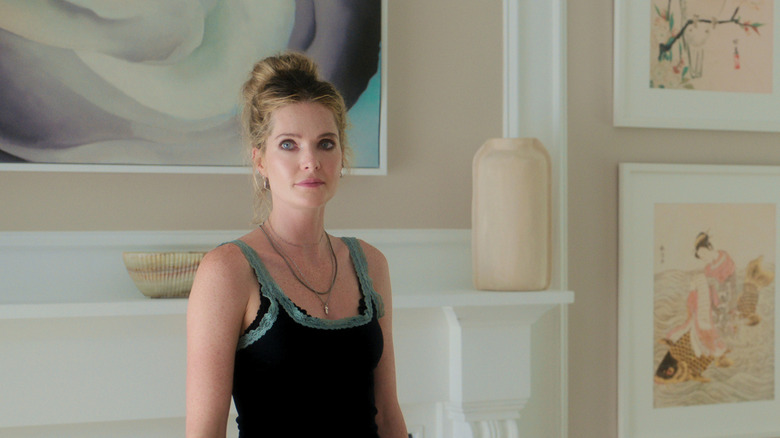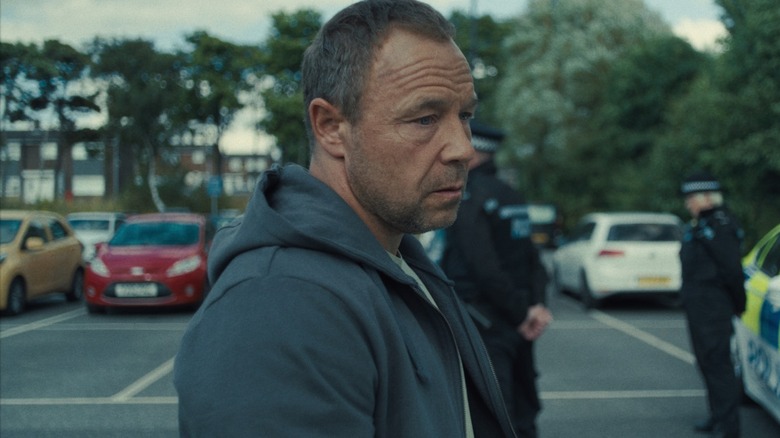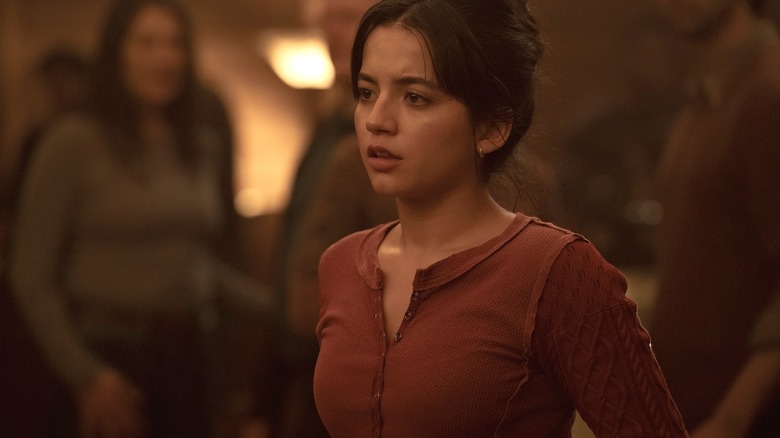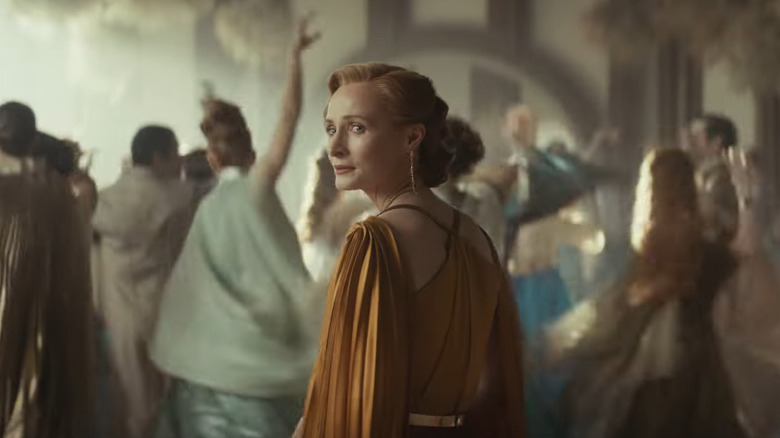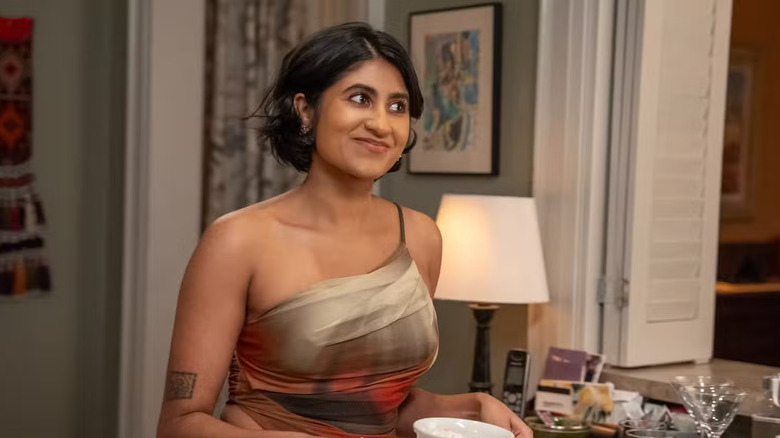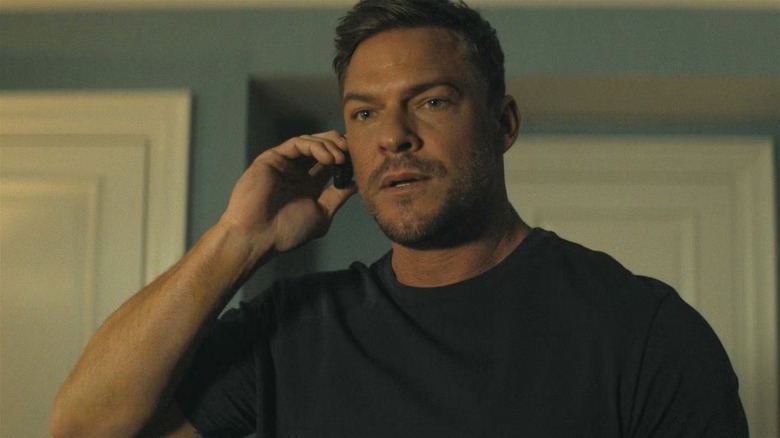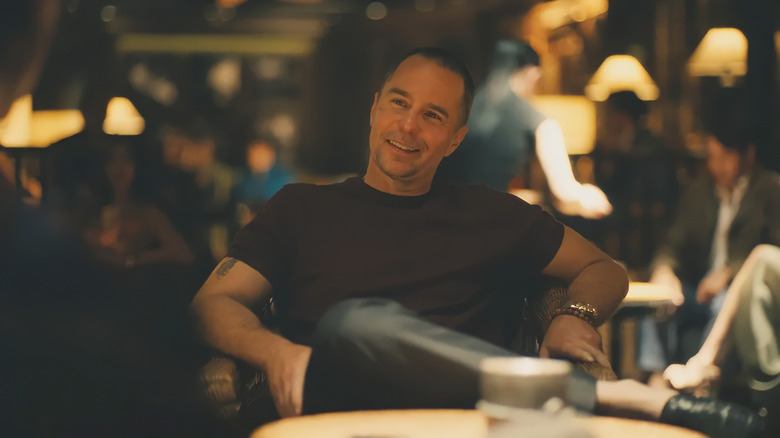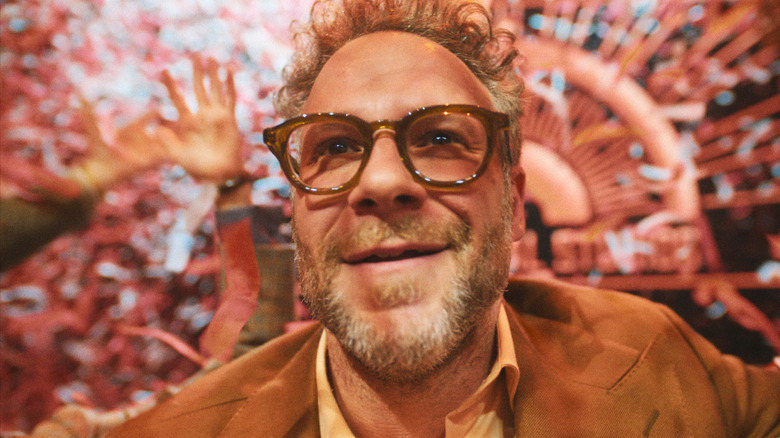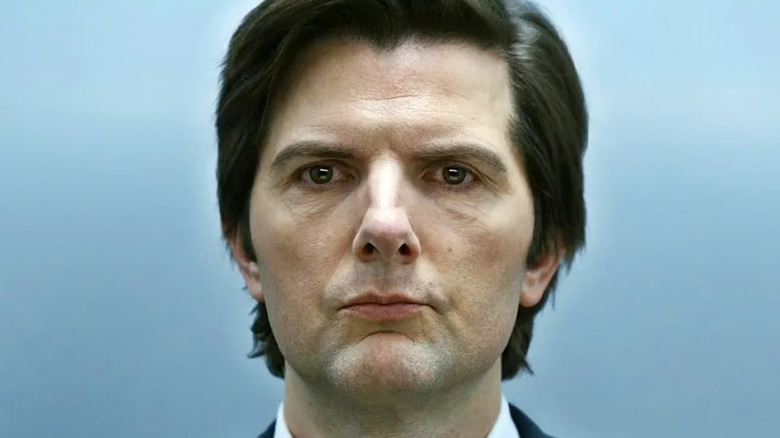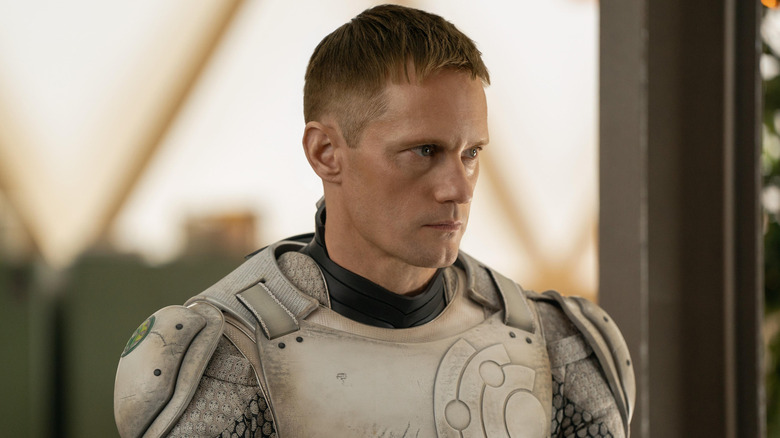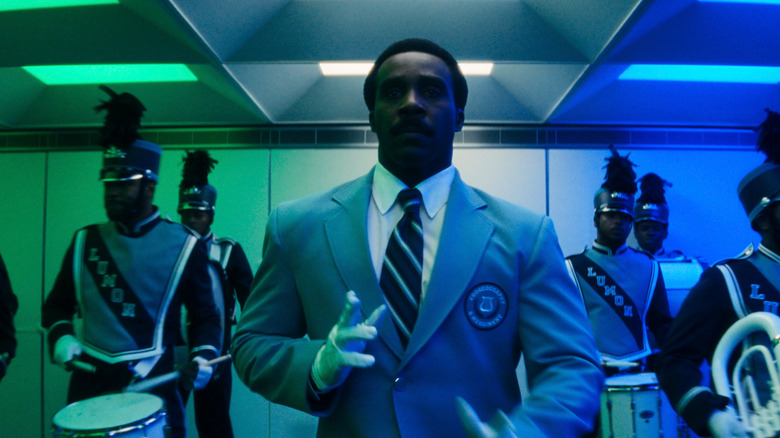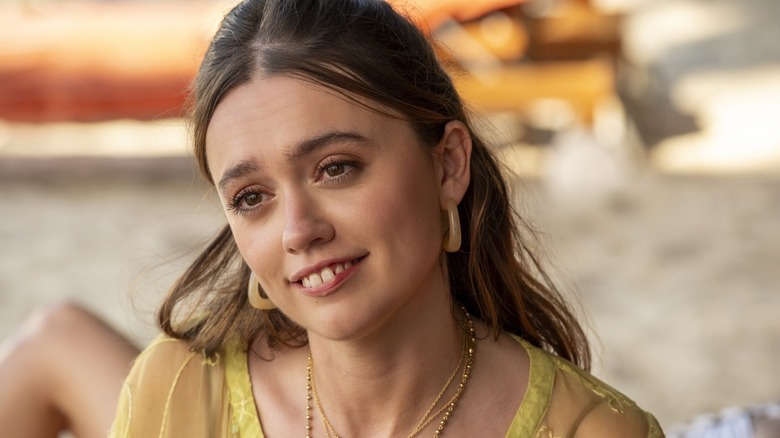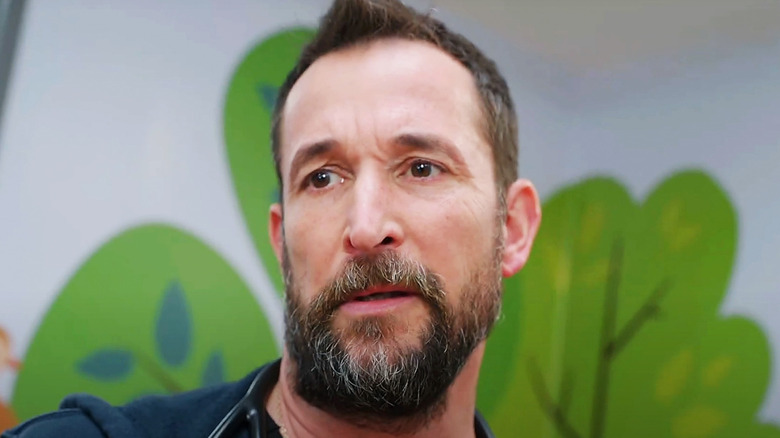20 Best TV Performances Of 2025 (So Far)
Once upon a time, TV acting was seen as somehow lesser than movie acting. That's no longer the case, of course, and these days some of the best of the best performances can be spotted on the small screen — especially as streaming grabs hold of everything. And yet, while some big movie stars have flocked onto TV, a lot of actors who have made their bones in the medium continue to thrive there and find new ways to flex their acting muscles. With that in mind, we've put together a list of some of the best TV performances of 2025.
Malin Åkerman — The Hunting Wives
Malin Åkerman has been one of the most consistently great character actors of the last two decades, but she's never been given a leading role that truly understands what to do with her balance of intensity, sweetness, comedic timing, and sex appeal. That is, until she got her claws into Margo Banks on the Netflix series, "The Hunting Wives." Åkerman is downright irresistible on the series, delivering a performance so tantalizing that you completely forget about the often distracting wigline on her forehead. As Margo, Åkerman embraces her significant height advantage over her prey, Sophie (Brittany Snow), embodying a new type of femme fatale that performatively votes Red to throw people off the trail that they're actually a hedonistic baddie.
What makes Åkerman's performance so fun to watch is that Margo is absolutely a bad girl, and not in the misunderstood, sympathetic villain type of way. She's a manipulative predator who does what she wants, when she wants, and how she wants, always looking for a way to get ahead without any concern for how it might mess things up for the people in her path. As the leader of the clique of conservative Texas socialites, evil comes naturally, but because Åkerman has such a command of the screen, it's easy to ignore all of her character's shortcomings and revel in her delicious depravity. (BJ Colangelo)
Laura Birn — Foundation
Laura Birn's portrayal of the positronic robot Demerzel in "Foundation" reached new heights this year. Birn's character started on the sidelines. She had a minor role in season 1 and didn't seem to have much to do with Hari Seldon (Jared Harris) and his Empire-resetting plan.
Over season 2 and especially in season 3, Demerzel's role has changed. She's emerged from the shadows and, in season 3, she was revealed to be behind several key parts of the plot. In a crazy twist, she was the one who destroyed the Starbridge, despite being bound by the Three Laws of Robotics. She grappled with the Humanity-saving Zeroth Law that guides her, as well, and in the end, her inner struggle culminated in a desperate act of sacrifice and physical destruction at the hands of a deadly serious Brother Darkness (Terrence Mann).
Don't worry, though. Demerzel will be back. By the end of the season, she was revealed as the real protagonist of the show, and her role in the source material doesn't end here anyway. Here's the thing. Demerzel is already an important part of the plot, but in the books, the character is quiet, off-screen, and tucked away for most of the story. Birn's performance has brought the robot into the limelight. The stunning blend of automaton and emotion has become one of the hallmarks of the show — and it goes down as a top performance of the year, to boot. (Jaron Pak)
Babou Ceesay — Alien: Earth
"Alien: Earth" hasn't quite broken containment as the next high-genre TV sensation, but it would be hard to call it a disappointment. Sure, the first season has its detractors, with criticism ranging from critiques of the show's lack of "Alien"-ness to the frequently wacky tone (The Sid the Sloth thing was wild, I'll admit it). For me and many, there was much more to love about the show than there was to complain about, and Babou Ceesay's performance as Weyland-Yutani cyborg loyalist Kumi Morrow is at the top of the list.
Ceesay has been an under-appreciated talent for years, with great turns on shows like "Guerrilla" and AMC's equally underrated "Into the Badlands" going largely unsung. This is arguably his most high-profile role to date, and he devours every scene, embodying a tactile post-cyberpunk rage and anguish that perfectly underscores the entire season. We can only hope that Ceesay gets even more spotlight as the show continues. (Rick Stevenson)
Owen Cooper — Adolescence
Raw talent is hard to find at a young age and even harder to control. For "Adolescence," however, it's a plus for first-time screen star Owen Cooper that he can just let it all go as Jamie Miller, the deeply troubled teen who swings a wrecking ball into the lives of his family after being charged for the murder of a classmate. And yet, daringly told through one-take episodes, Cooper feels like the biggest gamble because everything depends on him being the character that you both are frightened of and fear for. It's a huge responsibility for someone so young, yet somehow, the kid who had only been acting for three years handles it with ease.
The byproduct of a world his parents didn't know existed, Cooper's Jamie is an exceptionally believable depiction of one of many young, misinformed minds thinking that the world is against them. But just like his on-screen dad, there's a balancing act at play that he skillfully adjusts to. The best example of this is not only in the intense therapy session with child therapist Briony Ariston (Erin Doherty), but also in Owen managing Jamie's uncomfortable phone call to his family in the final episode, where a boy has a heartfelt conversation with the parents he knows he can't come home to. It's testing material to handle for one so young, but it's a performance that shows no sign of aging anytime soon. (Nick Staniforth)
Taylor Dearden — The Pitt
Every single person on "The Pitt" is really, really good, but what Taylor Dearden is doing on the medical series is something really, really special. At the beginning of the in-universe "shift" on "The Pitt" (every episode takes place "in real time") led by attending Dr. Michael "Robby" Robinavitch, we meet Dearden's Dr. Mel King, a second-year resident who recently worked at the VA (or in medical care for veterans), and it's a testament to Dearden's performance that we understand Mel more or less immediately. A little reserved and socially awkward at first, Mel opens up, particularly around the senior resident she seems to regard as her mentor — Patrick Ball's Dr. Frank Langdon, who leaves the fictional Pittsburgh hospital in disgrace halfway through the season — as well as patients with whom she finds common ground, and the moment where she pulls up a fake lava lamp app on her phone to provide some comfort and calm during her busy shift is nothing if not wholly relatable.
Dearden, like Mel, is neurodivergent, and the input she provided to creators R. Scott Gemmill, John Wells, and Wyle proved invaluable to the character's successful reputation. Whether she's trying to keep medical students in check, spending time with her sister Becca (Tal Anderson) after her shift, or getting incredibly excited about holding a newborn baby, Dearden's performance as Mel is lived-in, raw, and real. I hope we get to spend many, many more years in the proverbial pit with Mel. (Nina Starner)
Kaitlyn Dever — The Last of Us
To those who expressed outrage at the casting of Kaitlyn Dever as Abby in "The Last of Us" sight unseen, have we finally learned our lesson for the umpteenth time? Anyone even vaguely familiar with the talented actor beforehand could've anticipated she'd be up to the task of portraying one of the most controversial villains in video game history. Sure, there's no getting around the idea that Dever isn't exactly the musclebound wrecking ball from the source material. And, in some alternate universe, it's fair to say that the "Booksmart" star would've killed it had she been cast as main protagonist Ellie instead. These factors only make it all the more impressive that Dever was able to make this character entirely her own, however, and turn in an unforgettable performance in a minimum of actual screen time.
Dever doesn't get a ton to do in season 2, admittedly, but she makes every second count. Tasked with channeling the same tormented sense of revenge and fury as her video game counterpart, the actor takes the relatively broadly-sketched Abby and turns her into a person — one whose threat doesn't derive from the size of her biceps, but from the curdled rage and grief boiling over inside. Her most dastardly act yet, murdering the flawed but lovable Joel (Pedro Pascal) in cold blood, made a flawless leap to live action thanks to Dever's inspired reinterpretation of a killer monologue. Despite giving viewers every reason to hate her, Dever brings Abby's humanity to the forefront. When it's all said and done, Dever's casting will almost certainly be appreciated for what it is: a perfect choice. (Jeremy Mathai)
Hannah Einbinder — Hacks
There are few people in the entertainment industry who even come close to the commanding screen presence of Jean Smart, and when she's playing fictional comedy icon Deborah Vance on the fantastic HBO Max series "Hacks," she's absolutely in her element. She's a cynical sarcasm machine who keeps everyone at a distance, and it takes a partnership with young writer Ava Daniels (Hannah Einbinder) to actually grow to her fullest potential. The friendship and working relationship between Deborah and Ava is often as toxic as it is powerful, with the younger and less experienced Ava more than willing to call Deborah out on her nonsense. Ava is a truly unique character that feels written directly to Einbinder's strengths, as the actor is also a stand-up comedian in her own right who learned a few things about late night from her mother, "Saturday Night Live" alum Laraine Newman.
Einbinder is excellent as Ava, working as a perfect foil for Deborah while maintaining her own identity. She's a hilarious hot mess who lives in a mall and occasionally comes up with some truly tasteless jokes but she's vital to making "Hacks" the brilliant two-hander it's become. It takes some real talent to go head-to-head with Jean Smart and hold your own, and Einbinder does it with the kind of effortlessness you'd expect from Smart herself. (Danielle Ryan)
Meghann Fahy — Sirens
I still think, after a few years now, about how great Meghann Fahy was on season 2 of "The White Lotus," but in the Netflix original series "Sirens," Fahy proves, beyond any shadow of a doubt, that she can carry a TV show basically on her own even as she faces off against an Oscar winner. Fahy's Devon DeWitt is crude, grubby, and literally covered in dirt, sweat, and runny makeup when she arrives at the massive estate owned by Michaela "Kiki" Kell (Julianne Moore) to search for her sister Simone DeWitt ("House of the Dragon" star Milly Alcock), bearing news that their father's dementia is getting worse. Not only is Simone unhappy to see her caustic sister show up at her workplace — Simone aspires to be Kiki but settles, at first, for being the woman's personal assistant — but she has no intention of leaving with Devon, at which point Devon starts realizing the entire Kell estate might be way more sinister than she could possibly imagine.
Fahy is a master of miniscule acting, using her wonderfully expressive face to telegraph the tiniest of feelings and reactions — and that talent is on full display in "Sirens," even though the show also smartly lets her lean into some of her bigger impulses (her profanity-laced phone calls to her married sort-of boyfriend and boss Raymond, played by Josh Segarra, are incredibly funny). There's no denying that, over the past few years, Fahy's star has been on the rise. Hopefully, "Sirens" convinces more writers and directors to redesign their worlds around her. (Nina Starner)
Stephen Graham — Adolescence
Stephen Graham has spent most of his career inhabiting broken male characters shaped by traumatic pasts. His "Adolescence" character, however, stands out as we watch him gradually fall apart with each soul-shattering moment he endures.
In a show that takes a stand against toxic masculinity and its consequences, Graham's Eddie Miller also represents the traditional father figure who is forced to adapt to the times, no matter how dark they may be. The result is a truly remarkable transformation that depicts a man barely holding on as the head of his family to keep the world turning for them.
As soon as he sits through that indefensible footage of his young boy doing the unthinkable, he becomes a man searching for answers we know he'll never find, and in the end is left to retrace his steps and assess where he went wrong as a father. It's through this dead-end journey that Graham finally delivers what might be the finest moment in his career so far. For an actor whose highlights have seen him at his most explosive, the one he'll need to top involves him letting out silent and solitary tears before tucking a teddy bear into bed and sealing his well-deserved Emmy win right there and then. (Nick Staniforth)
Isabela Merced — The Last of Us
"The Last of Us Part II" is a relentlessly bleak video game. There are no silver linings here, as Ellie barely makes it out alive after embarking on a reckless path for revenge, heavily jeopardizing the safety of her friends in the process. The only ray of sunshine is Dina, Ellie's friend-turned-lover, who accompanies her (in the first half of the game) while offering a sense of warmth in a cold, desolate world. Isabela Merced brings the same quality to the second season of HBO's "The Last of Us," as she is the only person Ellie (Bella Ramsey) opens up to after the traumatic incident that compels her to seek revenge in the first place. Merced's Dina is also more resourceful in the series, effortlessly proving that she is not a liability, but a level-headed presence who can ground Ellie whenever she's consumed by her emotions.
Merced's natural charisma allows Dina to emerge as a complex character very early on, especially in episode 2, where she witnesses a major character death and is forever changed by it. This added detail allows Dina's charged relationship with Ellie to feel more natural, while the character's gradual shift from open trust to guarded anxiety heightens the tension inherent in this troubled central dynamic. We grasp the severity of Ellie's mistakes because Dina isn't fully on board with her actions anymore, and this realization exacerbates the gut-punch that accompanies some avoidable deaths toward the end. (Debopriyaa Dutta)
Genevieve O'Reilly — Andor
This entire list could easily be comprised of "Andor" cast members and it would still not feel like it was properly capturing how incredible that ensemble was. Still, there is one clear standout in a season full of standout performances — Genevieve O'Reilly as Senator Mon Mothma. Though she already did incredible work in the first season, O'Reilly's performance in season 2 is all-time great work, showing the transformation of a brave yet desperate senator whose double life almost comes crashing down, to a proud leader of the Rebellion. Two scenes perfectly capture why O'Reilly delivered one of the year's best performances. The first one happens in episode 3 when Mothma starts taking shots and dancing wildly to a club banger in the middle of a wedding, a moment that captures the vibe of 2025 in all its harrowing horrors and catchy tunes, with O'Reilly's silent performance nevertheless communicating a lot.
The other moment comes toward the end of the season when Mothma delivers an incredibly powerful speech to the Senate, calling out a genocide and challenging Emperor Palpatine. O'Reilly makes the speech a pivotal moment for Mon Mothma, showing just how much the senator is done with the Empire and how willing she is to throw everything away and become a full-time rebel, but also how absolutely horrified and vulnerable she is in that moment. It's a raw and enthralling performance that you can't forget easily. (Rafael Motamayor)
Amita Rao — Adults
"Adults" is definitely one of the most underrated shows of 2025, and on a show full of great performances from newcomers and small-screen favorites alike, Amita Rao steals every single scene she's in as Issa. When we first meet Issa, she lives in her friend Samir's (Malik Elassal) parents' apartment with him and their longtime best friends Billie (Lucy Freyer) and Anton (Owen Thiele), and once she convinces the group to basically adopt her new flame Paul Baker (Jack Innanen) — who is only ever referred to by his full name — the gang of four grows to five. Issa is a basket case in all the right ways, whether she's barricading a bunch of young dance students in a classroom to go on "strike" or at her therapist's funeral begging his widow to say how the guy really felt about Issa (she and Owen share a therapist and are convinced he died by suicide based on how annoying they were).
There are certainly comparisons to be made between Issa and Ilana Glazer's Ilana Wexler from "Broad City," but largely because "Adults" is grittier and more grounded than that Comedy Central series, Rao gets to put her entire range as a performer on display, including a gutting moment in the season 1 finale where she breaks some bad news to Paul Baker after the two make a major, if ill-advised, decision. Everyone on "Adults" is great, but when Rao's Issa is on screen, you can't bring yourself to look anywhere else. (Nina Starner)
Alan Ritchson — Reacher
It is not controversial to say that Prime Video's "Reacher" does justice to Lee Child's mega-popular "Jack Reacher" novel series. A lion's portion of this accomplishment, however, is owed to Alan Ritchson's rendition of Reacher, where the actor intimately understands what makes the titular character so beloved (and relatable). Apart from bringing Reacher's striking physicality to life, Ritchson imbues the vagabond with a brand of sardonic wit and humor that never feels grating, as it feels perfectly in keeping with his aloof, easygoing nature. Child's novel series has always been humorous, after all, and Ritchson translates these tongue-in-cheek character moments with a fluidity that complements Reacher's no-nonsense approach to everything. Ritchson has consistently been the most compelling aspect of every season of the show so far, but his performance in season 3 is more enjoyable and multifaceted than ever before.
Season 3 gives Reacher the perfect opportunity to do more than swing his fists and bash heads in. This time, he flexes his undercover agent muscles and proves to be the perfect candidate for the job. This paves the path for great physical comedy, where we see Reacher reach into the hollow of his shoe and yank out a tiiiiiny phone or grapple his way around a heavily-guarded mansion and run outside when no one's looking. Ritchson knocks it out of the park with these little instances of anxiety-laced comedy, while also maintaining a simmering vulnerability that humanizes the character at every turn. (Debopriyaa Dutta)
Sam Rockwell — The White Lotus
Season 3 of Mike White's hit mystery series "The White Lotus" was one of the most explosive yet, and the fuse was lit with the surprise appearance of Sam Rockwell as Frank, a character who was kept a surprise until the fifth episode of the season. Rockwell made for a welcome addition, but his delivery of a wild monologue about Buddhism, sexuality, sobriety, and self-reflection will undoubtedly be remembered as one of the all-time great moments of the series. Like so many of the self-indulgent American men who travel to Thailand to feel important or powerful, to escape the reality that they're a pathetic loser back stateside, Frank confesses that he came to the country to take advantage of women. It doesn't take long before he notes that he became "insatiable" and spent a thousand nights in hedonistic depravity.
"I realized I could f*** a million women, I'd still never be satisfied." White is playing with fire with the text of the monologue, but because Rockwell is one of the best actors currently working today, he elevates the complicated material with ease. When Frank then becomes a pivotal part of the rest of the season, despite him never falling into the same intensity as presented during his introduction, we now know so much about this character that we cannot unknow. It hangs over his every word for the remaining episodes, and weirdly becomes the anchor of the ensemble cast of chaos. (BJ Colangelo)
Seth Rogen — The Studio
Industry insider stuff is a touchy subject at the best of times. Making a sitcom that riffs on industry insider stuff is doubly so — just ask Fox's film studio comedy series "Action," which garnered rave reviews but never got beyond its first season. In 2025, "The Studio" cracked the code with a simple recipe: Make fun of all the Hollywood creepiness you can imagine, but offset the blows with the most perfect cringe comedy lead since Steve Carell's Michael Scott.
Seth Rogen's Continental Studios bigwig Matt Remick is perennially out of his depth and understands far less than he thinks, but boy, does he genuinely love movies. With him as the well-meaning focal point, "The Studio" is able to make Martin Scorsese weep, kick the entire industry's AI obsession in the groin, and "Weekend at Bernies" a passed out industry bigshot (Bryan Cranston) around with equal efficiency. With a less sympathetic man at the heart of the show, "The Studio" might be too cold and cruel to work. With Rogen's signature blend of cluelessness and earnestness, it all works like a dream ... one that might just be happening somewhere in Los Angeles right now.
As ambitious comedy shows go, "The Studio" is already all but guaranteed to become an all-time great. As co-creator, director, writer, and star Rogen's four Emmy wins for the show prove, he's an integral part of its success. Rogen has been very good for quite a while now. As history will likely find, "The Studio" marks the exact moment when he became truly great. (Pauli Poisuo)
Adam Scott — Severance
Adam Scott has always wanted to be an actor, and the man has spent decades paying his dues. If one follows his career from the early days, one will encounter a wide variety of odd projects. His TV debut was on the forgotten 1994 TV series "Dead at 21," and one of his earlier film roles was playing a foppish hedonist in "Hellraiser: Bloodline." He was in intense indie dramas, failed TV shows, and low-low-budget garbage (yes, I've seen "Off the Lip"). Yet Scott stuck through it all, taking project after project, determined to keep his career going. It would take a while, but shows like "Party Down" and "Parks and Recreation" would eventually fill out his resume and make him a recognizable star.
And through it all, Scott improved his craft bit by bit. He is markedly better in the 2020s than he was in the mid-1990s. "Severance" boasts his best performance yet, playing two roles. There is the innocent and somewhat adolescent Mark S. who, thanks to a brain implant, only knows what the world looks like from within his office. And there's the wounded and mourning Mark Scout, who has no memories of what the inside of the office looks like.
In a virtuosic scene (and the one that likely got him his Emmy nomination for "Severance" season 2), Scott plays both Marks in one scene, conversing via a video camera. We can see both versions of his character reveal their desperation and very, very different motivations. And, as it turns out, the two Marks have very different goals indeed. The depressed Mark, however determined to fulfill his goals, cannot reconcile with his own inner innocence. That's profound stuff. (Witney Seibold)
Alexander Skarsgard — Murderbot
Based on Martha Wells' "The Murderbot Diaries," Paul and Chris Weitz's "Murderbot" sees Alexander Skarsgard play a security cyborg who develops autonomy. What ensues is a very funny show about a machine that starts embracing some of humanity's best (and worst) traits — such as lounging out in front of the TV — while feeling contempt for our species. Murderbot was designed to protect humans, but it doesn't understand them.
Despite the show's funny premise, Skarsgard's performance requires him to walk a fine line between comedic and, well, robotic. After all, his character is a cold, emotionless cyborg, and Skarsgard's performance is delightfully restrained, expressionless, and intentionally awkward. Be that as it may, the actor's performance is also full of dry wit, elevating the comedy without losing any of his credibility as a believable cyborg. While the cold and detached elements are a by-product of its machinist nature, you also get the impression that Murderbot is bored and fed up, which is a testament to Skarsgard's ability to bring some humanity to an artificial character.
More than anything, "Murderbot" lets Skarsgard be weird — and that's where he truly excels as a performer. In many ways, the Swedish stud is the first person who comes to mind when we think of cinema and television's best actors at playing these types of oddball characters. Yet his performance in "Murderbot" throws in enough extra quirks to be genuinely surprising (Kieran Fisher).
Tramell Tillman — Severance
There's a reason why 2025 will go down as the Year of Tramell Tillman. Not content merely to steal the show in "Mission: Impossible – The Final Reckoning," the actor returned to "Severance" in season 2 as one of the clear breakout stars of the Apple TV+ series. Not just anyone could've fully understood the assignment as Tillman does here, striking the perfect tone for a premise as outlandish and idiosyncratic as this one — whether it be delivering flowery soliloquies about the importance of appropriate workplace behavior, silently concealing his true emotions raging beneath a placid face, or spitting out the most verbose insults once he reaches his breaking point. ("Devour feculence" will go down as an all-timer line reading.)
As complex and nuanced as Mr. Milchick already is on paper, it's Tillman's engrossing and flawlessly-calibrated performance that truly brings this character to life in all of his, ah, peculiarities. In the hands of a lesser talent, Milchick could've come across as a one-dimensional parody. Instead, we truly believe that he holds a near-religious devotion to all of Lumon's byzantine regulations and the teachings of Kier. We totally buy it when he plays the role of quietly menacing company man, enforcing even the most extreme of policies and turning the lives of all our poor Innies into a living hell. And who can forget his façade finally dropping during Lumon's creepiest and most unsettlingly corporate moment yet?
It's fitting that our lasting image of both actor and character in season 2 will be that impeccably choreographed dance number — a testament to the tireless work ethic, unparalleled comic timing, and sheer joy that Tramell Tillman brings as the true MVP behind one of the best streaming shows around. (Jeremy Mathai)
Aimee Lou Wood — The White Lotus
Mike White's HBO series "The White Lotus" was a massive breakout hit that combined travel porn with soapy drama, allowing audiences to vacation vicariously through the ensemble casts. Every season starts with a mystery death and then jumps backwards so viewers can try and figure out who dies and why. Since most of the characters on "The White Lotus" are pretty terrible human beings, it can be quite a bit of fun to try and figure out who ended up in a body bag, but Aimee Lou Wood's season 3 character Chelsea changed that.
Chelsea is the free-spirited girlfriend of Rick Hatchett (Walton Goggins), who has traveled to Thailand on a mission of vengeance, and she only wants him to be happy. She is quite simply too pure for this world and the mere idea of her being in danger makes "The White Lotus" season 3 pack a bit more punch than previous seasons because she's just so innocent and kind. Wood's performance helps make the character more than just an updated manic pixie dream girl, and she has some of the funniest bits in the whole season (her bit about not judging brothers Lochlan and Ratliff for their incestuous moment is hilarious). On the page, Chelsea only exists in service of Rick, but Wood's performance made her into a fully fleshed out woman with a heart of gold, elevating her to special status in the capitalistic and cold "White Lotus" universe. (Danielle Ryan)
Noah Wyle — The Pitt
It's true that the pandemic gave HBO one of its biggest shows in years, prompting "The Pitt" creator R. Scott Gemmill to showcase the post-pandemic trauma that still lingers for healthcare professionals. But you could just as easily argue that Noah Wyle was the key to propelling "The Pitt" to its massive success. Having starred as Dr. John Carter in "ER" for 11 seasons, the actor returned to the medical drama with "The Pitt" and clearly hadn't missed a step.
As Dr. Michael Robinavitch, Wyle perfectly captured the self-assuredness that comes with decades of experience in your profession. But the truly impressive part of his performance came from his ability to balance the confidence of a veteran doctor with a creeping anxiety that eventually explodes into a full-on breakdown. Dr. Robby's panic attack occurs in the same pediatric treatment room in which he had to say goodbye to his mentor, Dr. Montgomery Adamson, during the pandemic. It's a startling and truly upsetting moment not only because of Wyle's commitment to the moment, but because Dr. Robby had seemed so confident going into his 15-hour shift. To watch him crumble was both devastating, and just downright impressive.
Outside of that, Wyle basically put on an acting tour de force, cycling through every emotion imaginable in the space of an hour-long episode as he so deftly portrayed the emotional labor involved in emergency medicine. "The Pitt" grew out of the global pandemic, but without such a strong performance at its center, none of the show's social commentary would have hit home. (Joe Roberts)
